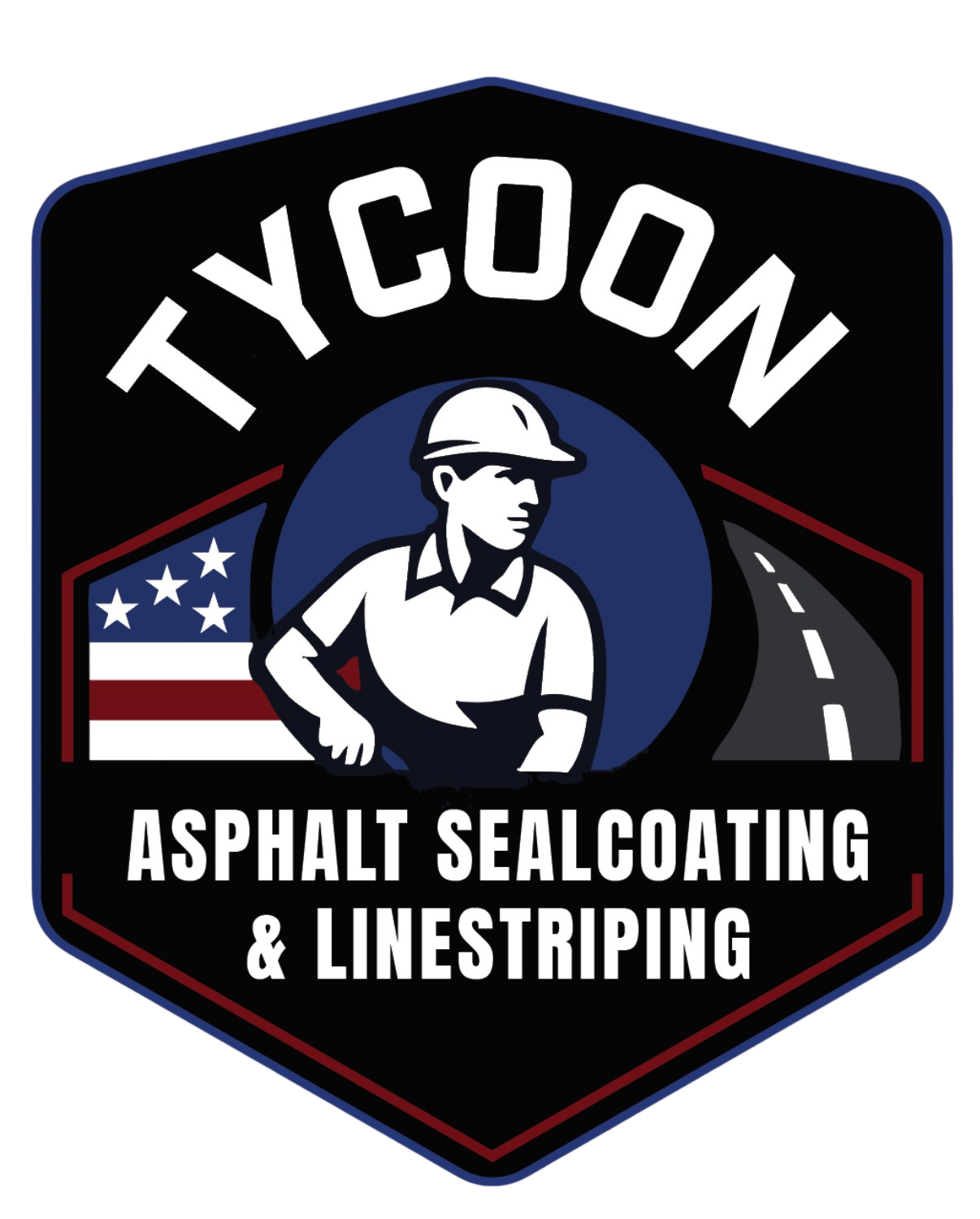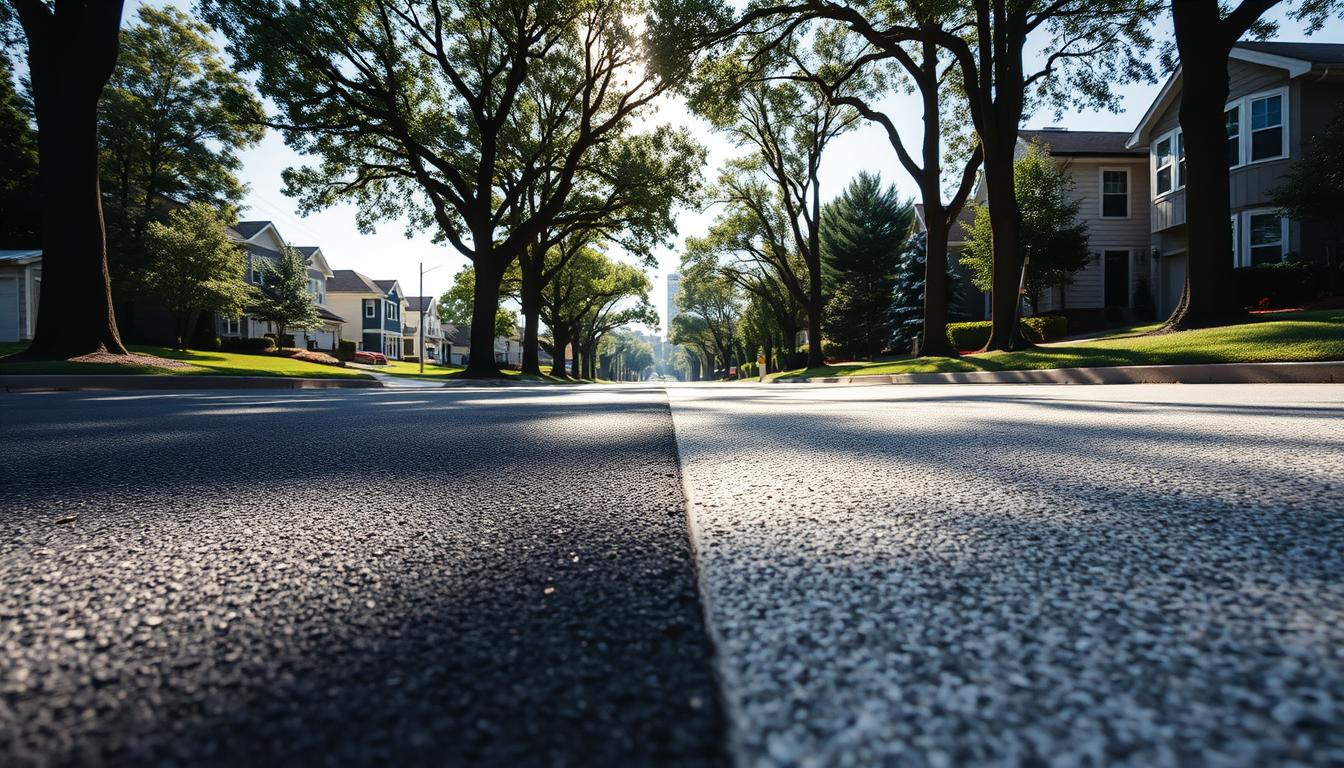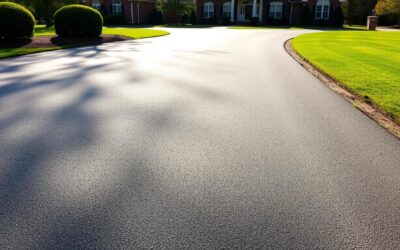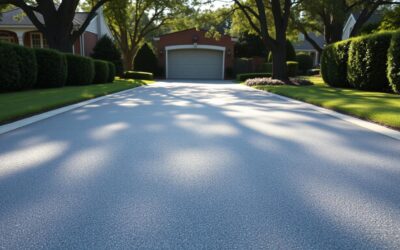We help Charlotte homeowners weigh a straightforward driveway choice for their home. Our goal is a clear comparison so we can decide on cost, timeline, and how each material handles local climate.
Upfront cost matters. Asphalt often runs about $2 to $7 per square foot installed, while basic concrete driveways usually start near $4 to $15 per square foot. Decorative finishes add to the price, and per square foot estimates help us plan budgets.
Installation speed and process differ. Asphalt concrete can be laid and compacted in a day with staged curing, while a concrete driveway needs forms, finishing, and about a week before light parking. We explain cement’s role, base prep, and other factors that affect the final cost and schedule.
Throughout, we focus on long-term value for our home. We compare maintenance expectations, how each option copes with heat and freeze, and the decision points that matter most to us.
How Charlotte’s climate shapes our driveway decision
Our driveway choice starts with how heat, rain, and occasional freezes affect materials over time. We look at how local climates create stress so we can plan for durability and fewer surprises.
Hot summers and freeze cycles: surface response
During long, humid summers the binder in asphalt can soften. That flexibility helps absorb small ground movement, but on the hottest days it may rut or scuff under parked tires.
By contrast, concrete’s lighter color reflects sunlight and stays cooler underfoot. It resists heat softening but can be prone cracking from freeze-thaw cycles if joints, curing, and base prep are poor.
Rainfall, drainage, and base prep to prevent problems
Heavy rainfall in the Carolinas makes proper grading essential. A compacted gravel layer and well-placed swales move water away from the driveway and foundation.
Water infiltration weakens sub-bases and leads to settlement or heaving. Both materials depend on drainage-first installation and seasonal inspections after big storms to protect long-term durability.
Cost comparison per square foot and total project expectations
We lay out realistic price ranges so you can plan a driveway budget that fits your goals. Below we compare per square and total numbers, note common extras, and flag items that change final costs.
Typical pricing and what drives the numbers
For a basic installation, asphalt often runs $2–$7 per square foot installed. That means a 600 square foot job commonly totals $3,600–$5,400, depending on haul distances and oil prices.
Concrete typically starts around $4–$15 per square foot. Decorative color or stamping adds $2–$5 per square foot. A 600-square-foot concrete driveway often falls between $4,800 and $9,000 for standard finishes.
Sample budgets, disposal, and timeline impacts
Removal and dumpster rental can add to project totals. Recycling options sometimes reduce haul-away fees.
Gravel depth, base compaction, and edge work influence cost and lifespan. Asphalt can be laid in one day with partial cure in 3–5 days. Concrete usually allows parking in about seven days.
We recommend checking proposals for contingencies like soft subgrade remediation so estimates match real conditions. Smart design choices let homeowners save without cutting corners.
Installation process and timing from demo to drive-on
We walk through the full installation timeline so you know what to expect from demo day to drive-on. This helps us schedule crews, deliveries, and when the family can use the new driveway.
Sub-base and gravel preparation
Both options start the same: tear out the old surface, grade the site, and place a compacted gravel sub-base. A well-graded base supports loads and forces water away from the slab or paving.
Asphalt timeline and sequencing
The typical installation is a one-day placement: base prep, hot-mix lay, compaction, and edge support. We keep traffic off for about 3–5 days and allow a full cure over 2–3 weeks.
Concrete timeline and curing
Concrete work usually takes 1–3 days: forming, reinforcement when specified, pour, finish, and joint cutting. Light parking is OK in about seven days; heavy vehicles should wait up to 30 days for full strength.
Plan for weather delays and insist on compaction tests, joint layouts, and a final walkthrough to protect your home investment.
Durability, lifespan, and maintenance in real-world use
We compare real-world wear so you know what to expect from different driveway surfaces over time. This helps us plan budgets, inspection cycles, and repairs before small issues grow.
Expected service life and common timelines
With steady upkeep, asphalt driveways commonly last 20–30 years. Routine sealing every 3–5 years and timely crack filling extend that life.
Concrete driveways often reach 40–50 years. Sealing is optional but can protect appearance and reduce staining. Matching patch color can be harder with concrete.
Heat, freeze-thaw, and traffic impacts
Hot summers can soften binders and allow tire marks on flexible pavements, while freeze-thaw cycles may lead to more cracking on rigid slabs without good joints and drainage.
Heavy turning, trailers, and work trucks speed wear. A compacted gravel base and solid edge support matter most to prevent settlement and edge failure.
Practical upkeep cadence and costs
We recommend sealing asphalt every 3–5 years at about $0.68–$1.64 per square foot. Professional concrete sealing runs about $1–$2 per square foot.
Watch for warning signs: raveling or open joints on pavements, standing water, and spalling on slabs. Timely maintenance adds years to any driveway and delays major intervention.
Aesthetics, curb appeal, and design options
Small finish details often make the biggest difference in curb appeal. We look at how material and design choices set the tone for a home’s exterior and which options give the best return on visual impact.
Concrete finishes: stains, tints, and stamped textures
Concrete driveways offer many design tools: integral color, stains, and stamped patterns that mimic stone or brick. Decorative color and stamping usually add about $2–$5 per square foot, so we pick features that show well up close and from the street.
Finish choices like broom, salt, or exposed aggregate affect traction and style. Cement mix and color additives shape the final tone and help match our home’s palette.
Where asphalt shines
Asphalt gives a sleek, uniform look on day one and frames landscaping cleanly. It ages to a lighter gray, but regular sealing restores a rich tone and crisp edges.
We often add brick or paver edging to either surface for definition. When HOA rules or a tight budget guide the decision, the minimalist presentation of asphalt concrete and expressive concrete driveways each have clear strengths for design, maintenance, and curb appeal.
Asphalt vs concrete Charlotte NC: which fits our goals and budget?
We balance practical needs and long-term goals to decide which surface fits our home and wallet. This choice looks at speed, upkeep, and how each option matches daily life.
When we’d choose asphalt
We pick an asphalt driveway when quick installation matters and upfront costs must stay low. Asphalt driveways get laid fast, let us use the space sooner, and repairs are simple and local.
This option is forgiving under heavy turning and is easier to patch if plans change later.
When we’d choose concrete
We choose a concrete driveway when we want longer life and less maintenance over decades. A concrete driveway costs more up front but often needs fewer interventions and offers strong design choices.
Quick checklist to pick the right driveways
– Need fast access and lower initial costs: choose asphalt driveway.
– Want longevity, less maintenance, and style: choose concrete driveway.
– Consider traffic, snow care, edge planting, and how often we’ll perform upkeep. Match those priorities to costs and installation timing to make the best choice for our home.
Total cost of ownership and resale value in the long run
We tally true lifetime costs so the driveway choice fits our budget and resale goals. Looking beyond installation, we pair upfront invoices with routine maintenance to see how costs evolve over 10, 20, and 30 years.
Upfront vs. lifetime costs, sealing cycles, and repair risks
As an example, asphalt driveways often need sealing every 3–5 years. Those cycles add to per square foot costs over decades and raise the chance of overlays or patching down the road.
Concrete driveways typically last longer and need less frequent surface work, though optional sealing can protect appearance. Curing time also affects when value is realized—faster access for some surfaces versus longer waits for heavy vehicles.
Perceived value to buyers and impact on marketability
Buyers may view concrete as more upscale because of longevity and lower routine maintenance. Still, a well-kept asphalt driveway presents clean curb appeal at listing time.
We recommend smart choices—right thickness, solid base prep, and good drainage—to extend lifespan and boost resale. Matching expected years in the home to the material minimizes surprises and protects our investment.
Local considerations: codes, drainage, and environmental impact
Permits and drainage rules are the quiet drivers of any driveway project in our area. We check municipal codes, curb-cut rules, and sidewalk tie-ins before scheduling crews so the job moves smoothly.
Permits, runoff, and neighborhood standards
We verify setback and apron requirements early. Many towns require specific grading so water flows to gutters or trench drains instead of pooling near the home.
HOAs sometimes dictate finish, color, or even the material allowed. Confirming those rules prevents rework and delays.
Recyclability, carbon footprint, and sourcing
We weigh environmental tradeoffs. Asphalt is partially recyclable but petroleum-based; concrete production uses cement with a higher carbon output.
Local aggregates and recycled content options affect lead times and per square foot pricing. We document material sources, base thickness, and compaction for future buyers and maintenance records.
Protecting edges and colder climates
Adding gravel shoulders or a French drain relieves hydrostatic pressure and extends service life. In colder climates we insist on good jointing and a compacted base to reduce freeze-thaw damage prone cracking.
Our take: a clear path to the right driveway choice in Charlotte
Let’s boil it down so we can make a confident decision. We weigh climate impacts, base prep, and long-term durability when picking a driveway for our home.
Quick rule: choose the lower-cost, faster-access option when time and budget matter. It typically lasts 20–30 years with sealing every few years.
Choose the higher-cost option when longevity and design matter most. Expect 40–50 years of service, broader finish choices, and light parking after about seven days.
Focus on solid installation, drainage, and a simple maintenance plan from day one. Get several bids that list base depth, mix specs, joint layout, and timelines so our final choice matches how long we plan to stay and the cost we accept.




0 Comments